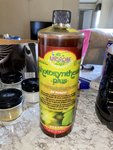Wires_Guy_wires
Imperial Masterpiece
By letting it rest for two days, you give sporulating bacteria and the spores of fungi enough time to germinate. They can float/suspend in water.How do you make a tea from this? Is it just water that drains out of the bucket?
Letting it rest any longer could potentially starve them, or it could cause one type of organism to overgrow or outcompete the rest. It's not a compost tea whatsoever, it's an inoculant mixture.
The idea is that you produce such an organism-rich juice that there has to be something that sticks, maybe a couple thousand, maybe a couple million, maybe a couple trillion.
Once they hit your plant, they either start living there, or they don't like the conditions and die. It's a game of big numbers and should be viewed as such. A small change in environmental conditions can eradicate half of the organisms present, if not more. Nature has always been like that, but it's easier to repopulate from a rich forest floor than from a tiled back yard. That's why I've been building a rich forest floor in my back yard; after straining the bucket, it's emptied in the back yard.
General comment:
I do want people to understand that ALL of these organisms produce their own chemicals, their own antibiotics, pesticides, their own capturing molecules, peptides and enzymes. What we buy in concentrated bottles is usually derived from one of those naturally produced molecules. The border between chemical warfare and biochemical warfare is thin, very thin. Some biologists are convinced there is no difference; microbes can produce the same stuff as we can, except that we humans suck at producing chemicals compared to microbes. I quite literally have an open bag of fungus (Ganoderma Lucidum) growing in my apartment. It's a monoculture, meaning there's one single fungus growing in there. Conditions are perfect for almost any fungus to thrive in there, bacteria too! Enough food to go around. But the organism is producing so many killer-molecules that it kills everything that touches it. It's producing multiple broad spectrum antibiotics. Kind of makes me wonder what the difference is.. Where does biological end, and where does chemical begin?
I use a wide array of chemicals, but also a huge array of biologically produced materials. I've used enzymes produced by a Yellowstone bacterium, and enzymes from one that lives in the mouths of guinnea pigs, to detect cancers in dogs. I use a sugar complex found in blueberries to make it visible on a polymer gel, said polymer is produced by algae. The wolbachia family of bacteria can do some Dr. Mengele kind of stuff to insects. I got rid of a skin condition antibiotics had no effect on, by using viral particles. The more I run into this stuff, the more I'm convinced that there is little difference between chemical and biological.
@Forsoothe! I think that the fermentation process can kill off / starve most pathogens. I wouldn't want human waste to be used, but they have done it in the past with almost no ill effects. I agree it's best to separate human waste from everything else, but they didn't. That's the magic part of good fermentation, and the Japanese and Koreans are the best in the world when it comes to that field. Space yoghurt, kimchi, yakult, soy sauce, you name it.
I know a guy who is into that kind of stuff. He can take a shit, then make some kimchi without washing his hands or his vegetables, and it's perfectly safe to eat. The pathogens I've tested, are not present, or way below the acceptable threshold and probably introduced when opening. For shits and giggles we did a side-by-side test with a washed hands batch and an unwashed hands batch, and there was no difference. Bacillus is one hell of species.






